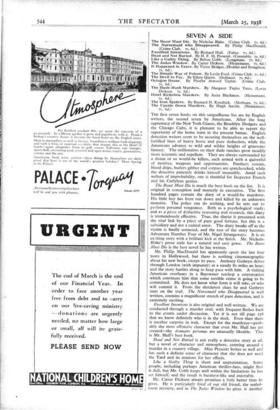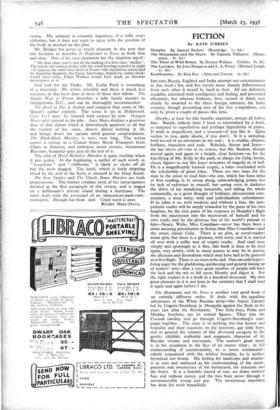SEVEN A SIDE
7s. 6d.) 7s. 6d.) The Hush-Hush Murders. By Margaret Tayler Yates. (Lovat Dickson. 75. 6d.)
THE first seven books on this sanguifluous list- are by English writers, the second seven by Americans. After the long supremacy of the New York Giants, the Brooklyn Dodgers and the Chicago Cubs, it is pleasant to be able to report the superiority of the home team in the present battue. English detection writers seem to be securing themselves on the well- fortified lines of heavy boots and pure deduction, while the Americans advance to wild and wilder heights of gruesome fantasy. The millionaires on their dude ranches grow steadily More eccentric and repellent. They are always surrounded by a dozen or so would-be killers, each armed with a quiverful of motives, weapons and opportunities. Panthers scream, blood drips, butlers gibber and corpses are spatchcocked, while the detective patiently drinks himself insensible. -Amid such welters of improbability, one is thankful for Inspector French and his Carlylean genius.
The Beast Must Die is much the best book on the list. It is original in tonception and masterly in execution. The first hundred pages contain the diary of a would-be murderer. His little boy his been run down and killed by an unknown motorist. The police can do nothing, and he sets out to perform personal vengeance. Both as a psychological study, and as a- piece of deductive reasoning and research, this diary is tremendously effective. True, the diarist is presented with the vital link by a piece of pure goOd fortune, but this is a subsidiary and not a radical error. The diary breaks off as the victim is finally cornered, and the rest of the story becomes Adventure Number Four of Mr. Nigel Strangeways. It is an exiting story with a brilliant kick at the finish. Mr. Nicholas Blake's prose style hai a natural- and easy grace. The Beast Must Die is the best novel he has written. - Mr. Philip MacDonald his apparently, spent the last four years in Hollywood, but there is nothing cinematographic about his new book, except its pace. Anthony Gethryn drives through London (with impunity) at a -steady 8o miles an hour, and the story hurtles along to keep pace with him. A' visiting American overhears in a Bayswater teashop a conversation Which convinces him thit some terrible crime is going to be committed. He does not know what form it will take, or who will commit it. From the slendereit clues he and Gethryn start on the trail. The Nursemaid who Disappeared" is --well written, contains a magnificent stretch of pure detection, and is extremely exciting.
Excellent Intentions is also original and well written. We are conducted through a murder trial, with frequent flashes back to the events under discussion. Yet it is not till page 238 that we know definitely who is in the dock. Even then there is another surprise in wait. Except for the murderee—prob- ably the most offensive character that even Mr. Hull has yet created—the dramatis personae are unusually likeable. This is Mr. Hull's best book.
Dead and Not Buried is not really a detective story at all, but a novel of character and atmosphere, centring around a murder in a country village. Miss Prescott Writes so well and has such a definite sense of character that she does not need the Yard and its minions for her effects.
Like a Guilty Thing is short and unpretentious. Some people, including perhaps American thriller-fans, might find it dull, but Mr. Cobb keeps well within the limitations he has set himself, and the result is business-like and enjoyable.
Mr. Carter Dickson always promises a little better than he gives. He is particularly fond of our old friend, the sealed- room mystery, and in The Judas Window he gives it another
outing. His solution is certainly ingenious, if a trifle over- elaborate, but it does not seem to agree with the position of the body as marked on the plan.
Mr. Bridges has given so much pleasure in the past that one hesitates to describe It Happened in Essex as both thin and slow. One of his own characters has the situation taped':
" My dear chap, you've got all the making of a first-class thriller '. The lonely old country house with the wind howling round it at night —I suppose the wind does howl in Essex—the mysterious owner and his beautiful daughter, the brave, handsome, impulsive, rather thick- witted hero—why, Edgar Wallace would have made an absolute masterpiece of it ! "
And now for the Yanks. Mr. Leslie Ford is something of a discovery. He writes tolerably and there is much less nonsense in this book than in most of those that follow. The Simple Way of Poison describes a jolly family murder in Georgetown, D.C., and can be thoroughly recommended.
The Devil to Pay is shorter and snappier than some of Mr. Queen's earlier exploits. The scene is set in Hollywood. Cap: Co I must be littered with corpses by now. Octagon House adds several to the pile. Asey Mayo displays a generous dose of that charm which is immediately apparent to all but the readers of his cases, detects almost nothing at all, and brings down the curtain amid general congratulation. The Hush-Hush Murders is very, very long. The action covers a voyage in a United States Naval Transport from China to America, and embraces secret treaties, mysterious Russians, beautiful spies and all the rest of it.
The plot of Hotel Richelieu Murders is quite exciting when it gets going. At the beginning, a surfeit of such words as " beautician " and " chifforabe " is likely to choke off all but the most dogged. The hotel, which is fairly dripping blood by the end of the book, is situated in the Deep South.
The Iron Spiders and The Upside Down Murders are both preposterous. The former contains most of the extravagances detailed in the first paragraph of this review, and is staged
on a millionaire's private island during a hurricane. The latter deals with the personnel of an amusement-park-cum- menagerie. Enough has been said. Crazy week is over.
RUPERT HART-DAV1S.











































































 Previous page
Previous page